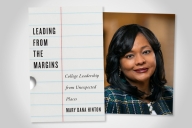You have /5 articles left.
Sign up for a free account or log in.
Despite merit-based college admissions, equal opportunity employment regulations and the long-held idea that in America, hard work is the key to social mobility, affluent graduates from elite institutions are still often the ones who find the highest-paying entry-level jobs. In her new book, Pedigree: How Elite Students Get Elite Jobs (Princeton University Press), Lauren Rivera, an associate professor of management and organizations at Northwestern University's Kellogg School of Management, aims to find out why.
Rivera sat in on the hiring processes of several prestigious and lucrative employers and interviewed those doing the interviewing, while protecting their anonymity. The employers featured in the book often valued graduates from prestigious colleges (in particular, Ivy League institutions), who were able to participate in "high-status leisure pursuits" outside of the classroom, such as playing lacrosse and squash, and who had prior work experience or internships at peer employers.
Pedigree is a candid look at why top-tier investment banks, consulting firms and law firms make the hiring decisions they do -- and how when firms say they're looking for the "right stuff," they often mean an elusive combination of economic, social and cultural resources that only those from affluent backgrounds possess. Rivera responded to questions about her book in an email interview.
Q: Pedigree is a study of the class biases behind some of America's most prestigious companies and firms. Some early reviews of the book, however, describe it as a how-to manual of sorts for those seeking to be hired. Are you surprised to see the book being described this way?
A: The purpose of the book was to reveal how taken-for-granted ideas about what merit is and how best to measure it contribute to class inequalities at the top of the U.S. economic ladder. I certainly did not intend for the book to be interpreted as a how-to manual. However, given rising levels of anxiety about class position among the relatively advantaged and the high stakes of getting jobs in these firms, I’m not entirely surprised that some people are using it as a tool to try to game the system.
I encountered this type of response before on a much smaller scale when I wrote an article on the use of extracurriculars in elite hiring several years ago. After the article received some press, my inbox was filled with messages from anxious parents requesting advice on how to best structure their children’s leisure time in order to maximize their chances of getting one of these jobs. The most humorous one was from a woman who asked me to develop a life plan to a specific firm for her unborn fetus. So no, it was not at all intentional, but it makes sense given the high levels of inequality -- and the unprecedented stakes involved in class stratification -- in our society.
My goal was to provide an inside look into how some of the nation’s highest-paying employers select new hires and how the ways they define and evaluate merit in real life contribute to persistent inequalities by class, race and gender. I hope that readers come away from the book with a more critical view of meritocracy, understanding that where you end up on the economic ladder is not just about ability or ambition but also about opportunity and access. I would like them to see that, counter to national narratives of a classless society, the playing field for top jobs and top incomes is far from level.
I also hope that people who are involved in hiring -- in these firms and otherwise, as the processes I discuss in the book are not limited to i-banking, consulting and law -- come away from the book with a desire to create more equitable and effective selection procedures.
Q: The bulk of this book is made up of your observations from sitting in on the hiring processes of elite and top-tier firms. Was it difficult getting this sort of access? You went to both Harvard and Yale; do you think this helped you in earning the trust of the firms you wanted to write about?
A: Access was difficult, but coming from these schools and having worked in management consulting previously helped immensely. I doubt that my participants would have felt comfortable disclosing such sensitive information to someone whom they perceived as an outsider.
Q: How aware are those doing the hiring that they may be helping to perpetuate this lack of social mobility?
A: I honestly think that most are not aware. They are simply doing what they perceive is best given real time and information constraints and hiring procedures that purposely give them strong levels of personal discretion. Without systematic guidance about what to look for, people fall back on their own lay theories of what makes a good hire and use themselves as models of merit.
Q: In the book, you note that the credential many firms "valued was not the education received at a top school, but rather a letter of acceptance from one." Should colleges be concerned by the fact that elite firms might care more about who an institution lets in than what that student gets out of the education there?
A: I think colleges should be concerned, particularly as it pertains to fulfilling their social and educational missions. But cynically, as I discuss in the book, I also think elite universities actually have strong incentives to turn a blind eye to this. Rankings and revenues have become crucial performance metrics for universities. At business and law schools, the salaries students earn after graduation factor directly into national rankings. So these schools have an incentive to send as many students as possible to these jobs, because they pay so much, regardless of why employers may be drawn to their students.
Maintaining close ties with these employers also is lucrative given that some universities charge firms large sums annually to “access” (i.e., interview) their students via on-campus recruiting. Having well-paid alumni can also affect donations down the line. So, there are conflicting incentives.
Q: If a student from a lower-class or working-class background graduated from Harvard, for example, would he or she finally be on a level playing field with students from elite backgrounds?
A: On a level playing field with students from Harvard from privileged class backgrounds? For the most part, no. The reason being that many of the signals of merit employers use in hiring -- like having a long track record of participating in leisure and passion-oriented extracurriculars and highly class-based definition of “polish” -- take time to learn and practice enough so they seem natural. The odds are even lower in law and business school, because the recruiting process happens so early on in students’ time on campus that they don’t really have time to learn both the rules of the game and how to play by them effectively. It’s not impossible, though, and does occasionally happen.
I document some of these cases in the book. Many of these individuals had exposure to elite worlds prior to entering college or professional school, so they entered with a baseline of cultural capital. But although they are at a strong disadvantage compared to their more privileged peers, low-income students at a place like Harvard are at a strong advantage compared to low-income students at nonelite schools; in all likelihood, the latter will never get their résumés reviewed, let alone seriously considered.
Q: Every so often, a study is released or a book is published that's a reminder that the idea of the American dream is really not happening for most people, or that higher education is perhaps not the great equalizer, as conventional wisdom would state. Why do you think this idea persists even after work like your book suggests otherwise?
A: It’s a good question and a complicated one. The idea that anyone can make it in the U.S. if you just work hard enough is deeply ingrained in our cultural imagination. I think it persists despite evidence to the contrary for several reasons. First, we are a strongly individualistic society. We like to believe that we are masters of our own fates. In this type of system, it’s embarrassing to admit that our successes may not be entirely of our own making. It's easier to explain away poverty as an individual failing. Acknowledging the power of external forces in our lives, like class, in many ways threatens the very core of that individualistic mind-set.
Second, Americans lack a sophisticated and coherent language for talking about social class. People frequently conflate the idea of a class structure with that of a caste structure and interpret any amount of mobility as evidence that the former doesn’t exist. And indeed, there is some -- although much smaller most than people believe -- movement between economic ranks. Most people can think of at least one person they know, even if they have to think back generations, who has experienced substantial upward or downward mobility.
In line with what behavioral economists call the "availability heuristic," we tend to overgeneralize from these familiar cases to believe that mobility is far more common and possible than it is. The reality is that in any class system, including ours, mobility happens. But the deck is stacked against it. And that’s hard for people -- particularly those in privileged positions who benefit from advantages outside of their control -- to digest. It’s simply not flattering. Likewise, I think because our society has become quite segregated by social class (in schools, in neighborhoods and in workplaces), many people don’t have an accurate understanding of what it means to be privileged. I always find it humorous when people whose parents were corporate executives or Ph.D.s tell me that they “came from nothing.”
Finally, while I think that that formalization can be a very good thing when done correctly, I do think that that many people are somewhat blinded by our current regime of merit-based selection procedures in education and employment. Knowing that top schools and top jobs are allocated on the basis of quantifiable metrics and supposedly “rigorous” processes keeps people thinking that competition is fair and based solely on ability, even when the definitions of merit used are out of reach for the vast majority of the population.








